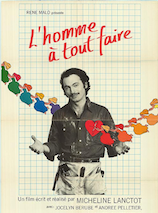Thursday, July 16, 1981.
L’HOMME À TOUT FAIRE (The Handyman). Music by François Lanctôt and Jocelyn Bérubé. Written and directed by Micheline Lanctôt. Running time: 93 minutes. Rated Mature. In French with English subtitles.
OH, WOE! THE WORLD is wallowing in despair, depression, dissatisfaction, ill-will, cynicism, claustrophobic paranoia, intolerance, impatience and impotent anger.
As of this writing, 13 of the [1981] Varsity Festival’s 18 premieres are behind us. The overall mood generated by virtually every film so far has been something less than positive.
The cumulative effect has been downright grim. So much so, that if I were a manic-depressive, I’d probably be a suicide statistic by now.
The bleakness of this year's event is lightened only slightly by Micheline Lanctôt's L’homme à tout faire (The Handyman). A romantic comedy, it is the story of a sentimental odd-jobber from Gaspé who loves not wisely.
Lanctôt, an award-winning actress for her work in such films as La vraie nature de Bernadette, wrote and directed this sweet-tempered look at a man and woman trapped by their own emotional weaknesses. It introduces us to Armand Dorion (Jocelyn Bérubé), a gentle handyman whose very vulnerability seems to attract aggressive females.
His problem is that he really is vulnerable, and when his women tire of his puppy-like presence, he is the one who ends up hurt and abandoned. Because his character is essentially passive, the focus of the film shifts the moment that Thérèse St-Amand (Andrée Pelletier) appears on screen.
A frustrated young housewife, Thérèse is indulged by her husband, who permits her constant home improvements and brief liaisons with the hired help. The problem with Armand is that he falls in love.
Pelletier, a dynamic and compelling actress, brings out all of Thérèse’s anguish, anger, sexual frustration and sensual charm. She turns what might have been nothing more than a suburban stereotype into a deeply tragic figure.
Armand’s declaration of love brings Thérèse’s dissatisfaction into focus. Suddenly, she knows exactly what she wants and she rebels, signalling her white knight to carry her off.
Armand, unfortunately, is no white knight. He is a disappointingly ordinary, unimposing and essentially unimaginative man. Just another lost soul adrift on the sea of life, he offers not the dramatic escape that she longs for, but strawberry Kool-Aid ("That's all I have") in a depressingly empty bachelor apartment.
Touching and tender, L’homme à tout faire is in keeping with the downbeat mood of this year's festival.
The above is a restored version of a Province review by Michael Walsh originally published in 1981. For additional information on this archived material, please visit my FAQ.
Afterword: In a 2017 birthday tribute to Micheline Lanctôt, Montreal movie producer Kevin Tierney wrote that “If there were a Mount Rushmore for Québec actors, hers would surely be one of the faces.” Published in the Montreal Gazette, it pointed out that “for the past 45 years she has done all of the following: written, directed and acted for film, stage and TV; she has been an outspoken and iconoclastic analyst of a wide range of social and economic issues; she has won every entertainment award available to her in Québec and Canada; she has outlived relationships and scandals and all kinds of life challenges. One might think Tom Petty had her in mind when he wrote I Won’t Back Down.”
Micheline Lanctôt was at the centre of a memorable moment in the development of a genuine Canadian popular culture. She made her acting debut in 1972, playing the title role in director Gilles Carle’s inventive dramedy La vraie nature de Bernadette. An instant star, she won the year’s Best Actress Canadian Film Award. Two years later, she charmed international audiences with her performance as Yvette Durelle, the Québécoise chambermaid who changes a Montreal hustler's life in director Ted Kotcheff’s The Apprenticeship of Duddy Kravitz.
L’homme à tout faire, her feature-film directorial debut, was a Genie Award nominee in six categories, including best picture, direction (Lanctôt), actor (Jocelyn Bérubé), actress (Andrée Pelletier), screenplay (Lanctôt), and art direction (Norman Sarazin). In 1984, she won the best director Genie for her second turn behind the camera, the urban coming-of-age drama Sonatine. Additional nominations went to Lanctôt for her screenplay, teen-aged actress Pascale Bussières for her performance, and Lanctôt’s brother, composer François Lanctôt, for his musical score.
As Teirney wrote in his newspaper tribute, Lanctôt’s creativity remains a positive force in French-Canadian culture to this day. Sadly, it's a history many of us missed, as the federal bureaucrats charged with fostering a national film industry displayed less and less interest in sharing Québec’s treasures with the rest of Canada. Because it would be wrong to suggest that they were bought off by U.S. corporate lobbyists representing the interests of a rapacious American film industry, let’s just say that they’ve been asleep at the switch for the last 40-odd years. Micheline Lanctôt turns 72 today (May12).
